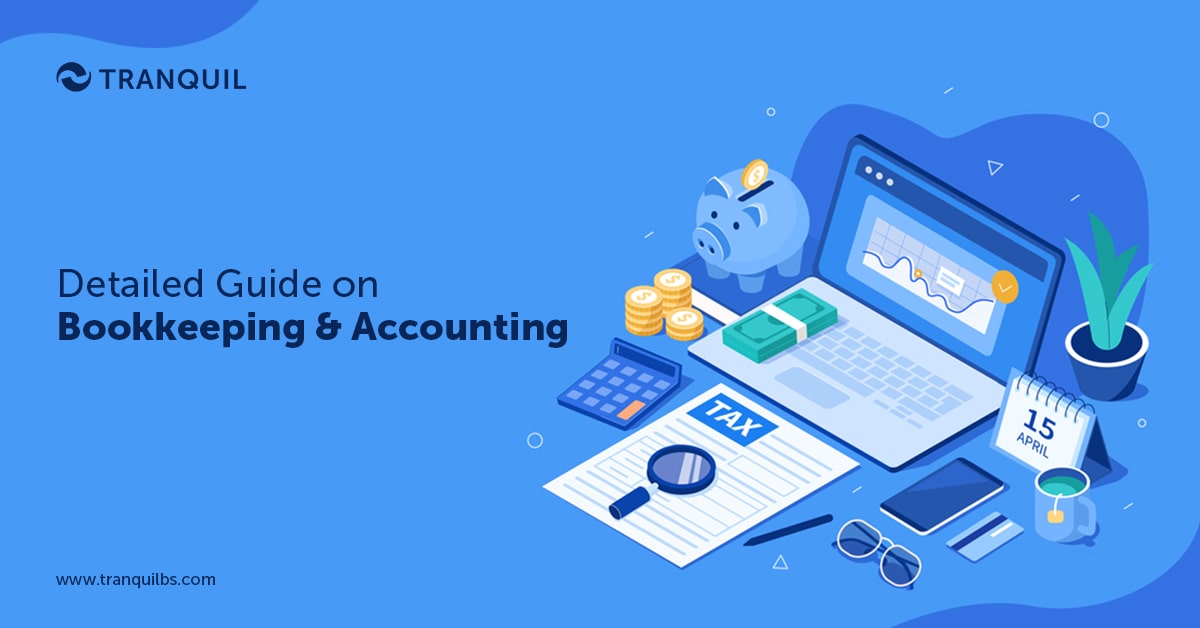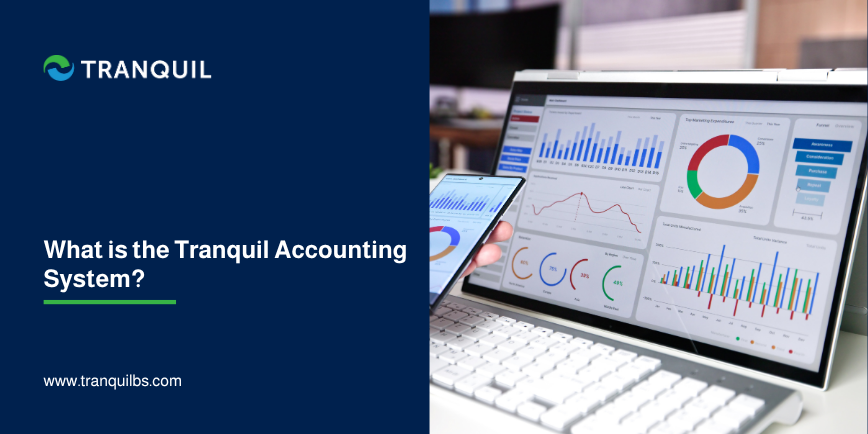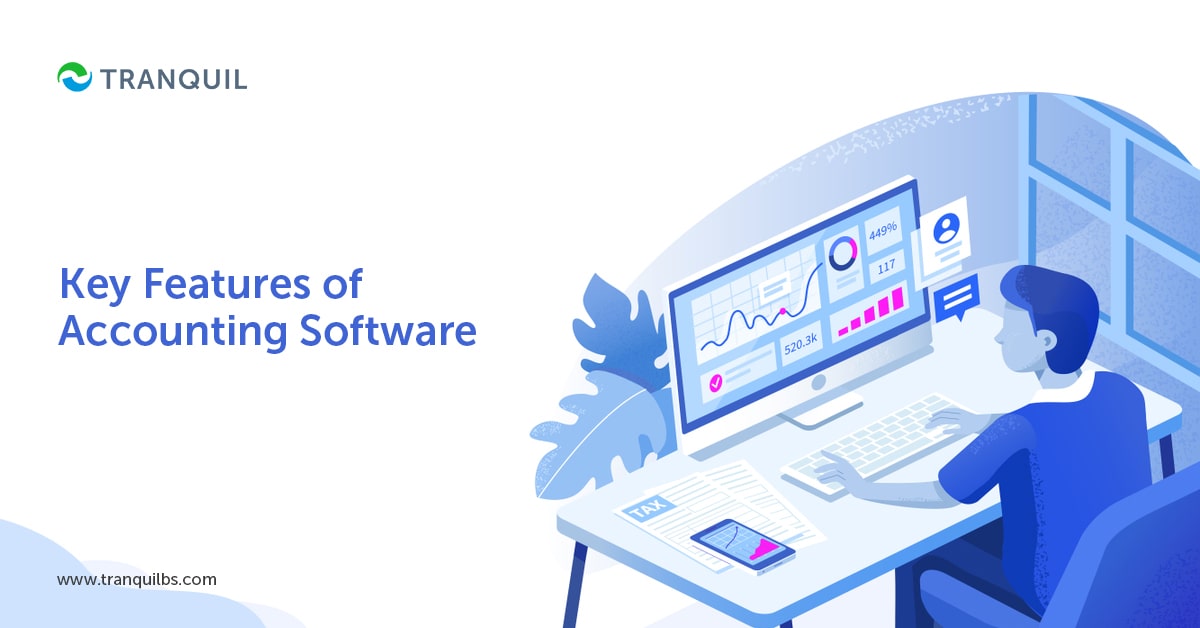
Detailed Guide on Bookkeeping and Accounting
Most people tend to use the terms bookkeeping and accounting interchangeably; while the two are related, there is a slight difference between the two.
Businesses need their financial data to be accurate and current to be able to make the right decisions and ensure a good cash flow.
When your business grows, your clientele, employees, customers, vendors, and consequently the number of transactions grow manifold, it can become difficult and time-consuming to monitor the money entering and leaving your business.
The tasks may become too much for just a bookkeeper to handle, and you will need an accountant also.
Of course, eventually, even these may not be able to do the work by themselves.
But why a bookkeeper and accounting?
ALSO READ: Debit Note vs Credit Note
The Difference Between Bookkeeping and Accounting
A bookkeeper maintains records of the financial transactions that take place in a business everyday – sales, purchases, bill payments, and so on, categorizes them, recording them as debits or credits in various accounts.
In bookkeeping, the focus is entirely on keeping accurate records.
An accountant depends on information recorded and submitted by the bookkeeper, reviewing and analyzing the financial records, and interpreting the financial information for the business.
Accounting transforms records into data that can be reported and presented, so that owners and managers can use it to make informed decisions and make financial forecasts.
In other words, we can say that bookkeeping is the preliminary function to actual accounting.
The accountant prepares quarterly, half-yearly, or annual reports after thorough analysis and review.
They check that all accounts have been properly categorized.
Bookkeeping and accounting includes preparing the profit and loss statement and the balance sheet; every country has specific standards or rules regarding how the annual accounting statements and reports have to be prepared, with which the accountant has to comply.
Let us now look at both functions in some detail.
ALSO READ: A Brief Guide To Purchase Price Allocation (PPA)
Bookkeeping

Bookkeeping is the process of consistently recording the everyday financial transactions, like sales, cash, and bank transactions, expenses, and also payments in the ledger.
This activity is referred to as posting.
Bookkeeping can also include generating invoices and payroll for the business.
The size of the business and the types of accounts it handles, determine the bookkeeping activities to be performed each day.
Bookkeepers are responsible for ensuring that financial data is recorded, treated, and presented accurately.
Bookkeeping Tasks
- Recording daily expenses, sales, cash transactions, bank deposits, cash incomes
- Preparing cash flow statements
- Payroll processing
- Generating invoices
- Monitoring debts
- Paying invoices of vendors and contractors
- Reporting issues that occur
- Help accountants in tax calculations
- Account reconciliation
- Maintaining the yearly budget
- Ensuring the books of account are current
ALSO READ: Ways to Improve the Procurement Process
Accounting

Accounting involves storage, retrieval, summary, interpretation, and presentation of bookkeeping data in the form of analyses and reports.
Accounting evaluates cash flows, assets, liabilities, and the financial position of the company in the near future.
Accounting has a broader responsibility and is more concerned with financial reporting and analysis.
The chief aim of accountancy is providing critical financial information to stakeholders like investors, managers, and owners, enabling them to strategize and take informed business decisions.
Accountants perform financial analysis and interpretation to generate sophisticated reports to determine the financial health of the business as of now and likely position in the future.
One can compare accountants to doctors – in finance.
They check for symptoms and prescribe the best path of action to improve the financial health of businesses.
ALSO READ: Tips to Improve Supplier Performance
Tasks are Undertaken by an Accountant:
- Preparation and analysis of financial statements like profit and loss and balance sheet
- Analysis of operations costs
- Completing income tax returns
- Recording the expenses that the bookkeepers omitted
- Supervising the work of bookkeepers and ensuring that transactions are recorded and categorized correctly
- Giving stakeholders an understanding of the financial health of a business and delivering strategic information
Any business event that has a monetary element to it is called a transaction – like purchasing materials from vendors, paying salaries, receiving money for sale of goods, etc.
ALSO READ: Accounting Trends in 2023
Financial accounting operates on the following fundamental principles:
- Objective – financial statements must be unbiased
- Usable – financial documents must be easily understood and aid decision-makers
- Material – documents must be complete and accurate
- Comparable – statements must follow international standards and allow comparison of similar companies
The Need for Accounting

Accounting begins with bookkeeping and culminates in reporting and recording of information in the form of financial statements at the financial year-end.
It facilitates the following:
1. Cash flow Monitoring
Maintaining proper books of account helps in keeping an eye on cash requirements, working capital, and so on, and gives you a clear picture of the financial health of your business.
ALSO READ: Vital Procurement KPIs You Cannot Ignore
2. Business Performance Tracking
Thanks to bookkeeping, you have a meticulous record of financial transactions for each financial year which shows you the company’s financial health and allows comparison of financial performance over a few years.
You get to know how your business is doing, what the situation is with the expenses, possible debt, gross margins, and so on.
This helps in proper budget allocation as well.
3. Streamlining Future Objectives
The accounting data you accumulate over the years helps in strategizing and create budgets for the future considering specific objectives.
It also becomes simpler to evaluate the various financial reports and charts necessary to conduct routine business operations.
4. Faster Decision-Making
Proper reading and understanding of accounting information facilitates accurate decision making and enables formulating policies that help your company become more efficient and productive.
For example – it can help you in your pricing decisions and determining resources required to produce those goods or services.
ALSO READ: Procurement vs Purchasing
5. Easier Auditing
With proper accounting knowledge, you can better understand the intricacies of your business.
You will be able to interpret the financial statements like the profit and loss statement, balance sheet, etc., and make decisions for business growth.
It also prepares you for audits and helps have a smooth process.
The Need for Bookkeeping

Bookkeeping and accounting form a solid base that allow the smooth functioning of business operations.
Bookkeeping is a critical function for a business whether it is a startup, an enterprise, a small business, or a mid-sized one.
Failing to record financial transactions properly gives rise to improperly managed accounts, and poor financial management, which can affect the business negatively.
ALSO READ: Challenges and Opportunities of AI in Procurement
Proper bookkeeping facilitates:
1. Improved Financial Management and Analysis
Improper management of accounts and disorganized cash flows can be a big headache for business owners, and hamper decision-making too.
But with accurate bookkeeping, you can ensure everything is current and ordered, like vendor payments, invoicing, follow-ups, and more.
2. Tax compliance
Bookkeeping plays an important role in helping organizations maintain compliance with tax regulation, and stay abreast of changing laws, submitting the correct information, and preparing documents to fulfil tax obligations.
When the bookkeeping is accurate, you have all reports, bills, and invoices in one place when you have to compute tax liability.
With all the information in your balance sheet, you can also discover ways to save tax.
ALSO READ: What is P2P (Procure to Pay) Process?
3. Simpler planning
Regular and meticulous bookkeeping can help you plan your business activities in such a way that it benefits the business.
You have financial details at your fingertips, and get to check the progress – is it on track for growth, or you need to correct the course?
4. Investor Reporting Made Simple
Bookkeeping provides charts and graphs of data that make report generation simple.
This conveys important information to investors and other stakeholders about your business in a clear and concise manner and helps to build trust.
Why You Need Accounting Software

The days of complete manual bookkeeping and accounting are in the past; today even tiny businesses and startups are moving to using financial accounting software.
This is for the simple reason that software offers innumerable benefits compared to manual methods.
ALSO READ: Ways to Reduce Customer Lead Time in Inventory
Let us see what they are.
1. Enhanced Accounting Accuracy
By eliminating manual effort, accounting software also minimizes the chances of calculation errors.
In manual bookkeeping, many calculations are performed by the employees, increasing possibility of error.
A simple error early in the process could snowball into a huge one towards the end of the accounting period.
This possibility does not exist when you use computers to calculate; yet, human error could still creep in through erroneous data entry, and you must be careful in that regard.
2. Increased Speed
Obviously, software works much faster than human beings, and as such, the accounts of a business can be processed much quicker.
The software also brings in greater efficiency with automation.
For example, you can configure the solution to record the tax component of each sales transaction automatically, instead of having an accounts employee do it manually at a later time.
ALSO READ: Why Do Businesses Need Purchase Requisitions?
3. Cost Reduction
When there is greater speed and efficiency, it is natural that your overall expenses will be automatically lowered.
Your accounts team can also accomplish a lot more in a specific time period, allowing them to shift from mundane tasks to more value-adding ones.
You will also not need to have a huge team to do the job.
Either way, you can bring down the expenses associated with administration and accounts payroll.
Of course, you will have to compare the savings in cost with what you have to pay for the software itself.
ALSO READ: Cost Effectiveness Vs Cost Efficiency
4. Robust Reporting
Tranquil’s accounting module delivers accurate and time-bound financial information to relevant teams and managers – whether it is cashflow reports for the finance manager, or tax computations for the auditor.
Our software allows you to generate a wide suite of reports based on varying parameters thanks to its in-built reporting module.
All it takes is a few clicks or filling up a simple form and you can have reports in seconds.
The same task would take you several hours if attempted manually.
5. Simplified Tax Filing
Calculating and filing your taxes is a complicated process which necessitates keeping tabs on every business transaction.
Thanks to Tranquil ERP’s Financial Accounting module, this becomes a breeze, as all financial details are available in a single place.
We can also tweak the software to include any specific functionality your business may need.
ALSO READ: What is Goods Received Note (GRN)?
Implementing a cloud-based accounting solution like Tranquil will deliver innumerable business benefits for your company. It is secure, fast, reliable, and streamlines your accounting processes. Schedule a FREE demo to know more.



